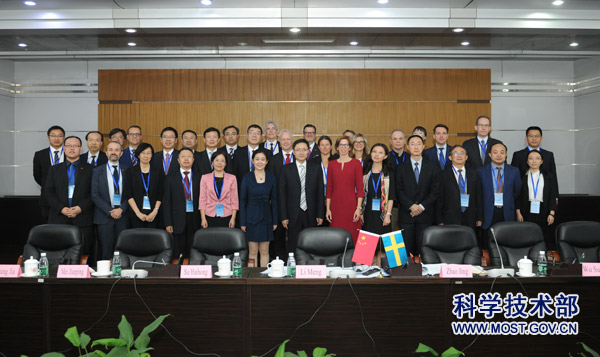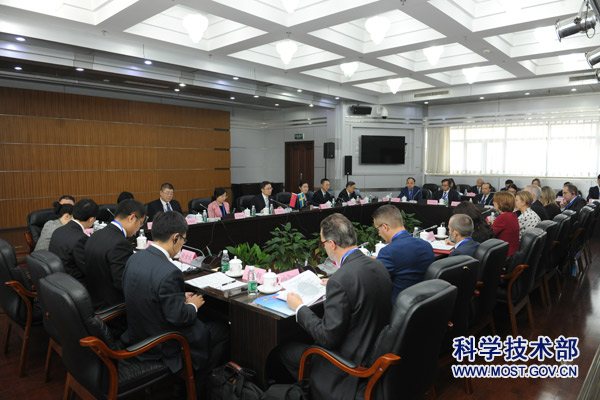

To deliver on the agreement reached by President Xi Jinping and Swedish Prime Minister Stefan Löfven in 2017, deepen China-Sweden cooperation in science, technology, innovation and facilitate personnel exchanges, the Fifth China-Sweden Joint Commission Meeting on Science and Technology Cooperation was held in Beijing on September 24, 2019. The meeting was co-chaired by Vice Minister Li Meng of the Chinese Ministry of Science and Technology and State Secretary Malin Cederfeldt Östberg of the Swedish Ministry of Education and Research.
At the meeting, Vice Minister Li Meng briefed the Swedish guests on China‘s strategy of innovation-driven development, the vision of innovative, coordinated, green and open development that is for everyone and relevant policies and achievements in the field of science, technology and innovation (STI) in recent years. He said that Sweden was the first Western country that established diplomatic relations with the People’s Republic of China and that STI cooperation has long been one of the highlights of China-Sweden relations. He pointed out that the two countries share common ground in terms of innovation. The past more than 40 years have witnessed sound mechanisms, deepened research cooperation and talent exchanges, and close public-private partnership. Vice Minister Li Meng made suggestions for future China-Sweden STI cooperation: 1. strengthen policy and strategy connectivity in the field of STI between the two countries, find suitable areas for cooperation, pool research and innovation resources of both sides and form a research innovation network based on friendship, mutual trust and close cooperation; 2. leverage the important role of the joint committee in mechanism coordination, overall planning and decision-making and make good use of cooperation mechanisms and channels at all levels to provide strong support for China-Sweden STI cooperation; and 3. draw upon the China-EU Co-funding Mechanism for Research and Innovation to promote China-Sweden exchanges and cooperation in STI projects and talents and contribute more science and technology results to the 70th anniversary of the establishment of diplomatic relations between China and Sweden next year.
State Secretary Östberg introduced to the Chinese host Sweden’s STI strategy and policy. She said that Sweden attaches great importance to STI cooperation with China and hoped that the two sides could deliver on the agreement reached at the joint commission meeting, further deepen practical cooperation between the two sides in policy exchanges, science and technology projects, personnel exchanges, and contribute to sci-tech advancement and socio-economic progress in both countries. Swedish Ambassador to China Helena Sångeland attended the meeting and spoke highly of the positive role of STI cooperation in promoting bilateral relations.
At the meeting, the two sides reviewed progress in the field of STI in China and Sweden over the past two years, including the evaluation of cooperative projects already implemented and summary of local and talent exchanges, and discussed cooperation in the fields of sustainable development, life science and health care, Arctic research, ICT and hi-tech Winter Olympics. The two sides reached agreement on optimizing joint sponsorship mechanisms, strengthening bilateral cooperation in science parks and incubators, pushing forward local cooperation, deepening and expanding cooperation in fields of common interest, and further discussing the signing of a memorandum of understanding on cooperation in innovation and entrepreneurship.
Attending the meeting were delegates from the Chinese Ministry of Science and Technology, the General Administration of Sport, the Chinese Academy of Sciences, the Chinese Academy of Engineering, the National Natural Science Foundation of China, the Chinese Association of Science and Technology, the Chinese Embassy in Sweden and local science and technology departments of Beijing, Jiangsu and Zhejiang, as well as from the Swedish Ministry of Education and Research, the Swedish Research Council, the Swedish Polar Research Secretariat, VINNOVA, the Swedish Energy Agency, STINT, the Swedish Incubators & Science Parks and the Sweden Embassy in China.

